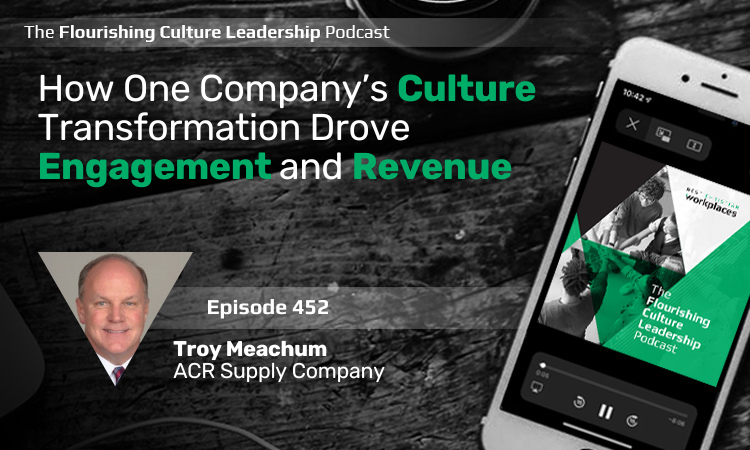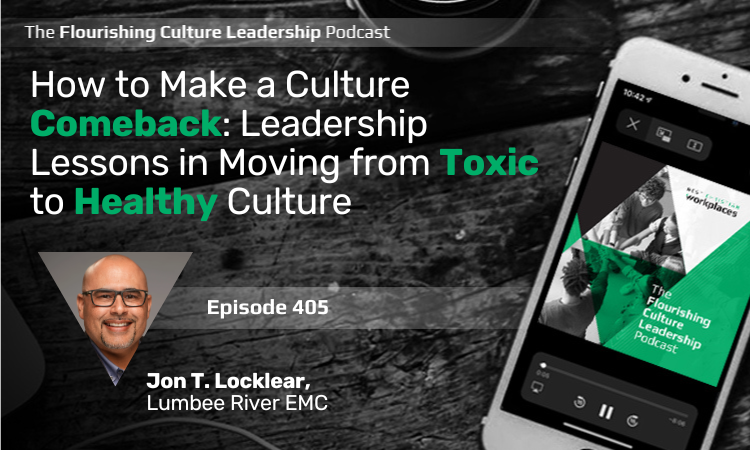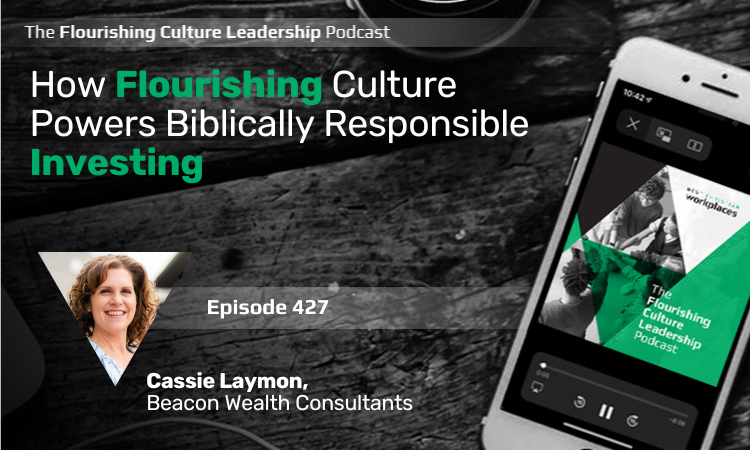What happens when a president leads with intentional communication and a heart for spiritual impact? In this encore episode, Troy Meachum, President of ACR Supply Company, shares how trust, stewardship, and a people-first approach have shaped a flourishing workplace culture.
Listen to the Audio
Listen in Apple Podcasts | Listen in Spotify | Listen in YouTube Music
In this episode:
Background & Growth
- Troy Meachum joined ACR Supply in 1980; became General Manager in 1993. (02:13)
- Since 1997, revenue has grown from under $4 million to over $32 million. (02:48)
- ACR Supply is a family business founded by Troy’s father in 1977. (02:21)
Initial Culture Pain Points
- Outdated Management Style: The company operated with a traditional ‘70s/‘80s management style that lacked cultural distinctiveness. (03:43)
- Wrong People on the Bus: Needed to address underperformance and misalignment through crucial conversations; used the mantra “change people or change people.” (04:09)
- Unhealthy Conflict Management: Employees lacked tools to handle conflict well.
- Troy became certified to teach Crucial Conversations and now requires all employees to complete the 16-hour course. (05:22)
- Need for Personalized Care: Recognized the importance of caring for employees spiritually, emotionally, and practically; saw the company as a ministry. (06:27)
Culture Measurement & Continuous Feedback
- Began annual team member satisfaction surveys before joining Best Christian Workplaces. (07:36)
- Surveys gather anonymous, candid feedback with 100% participation. (08:03)
- Leadership team reviews results at an annual retreat and creates specific action plans. (08:10)
- Focus on listening and acting on employee suggestions to build trust and engagement. (08:17)
- Surveys allow the company to identify year-over-year trends and areas for improvement. (09:30)
Healthy Communication in Action
- ACR’s culture emphasizes:
- Acting on employee suggestions. (11:15)
- Involving staff in decisions. (11:14)
- Encouraging innovation. (11:23)
- Seeking employee feedback. (11:18)
- After survey analysis, cross-functional teams are formed to address specific issues. (11:58)
- Every team member participates in a 1:1 “readout” conversation about survey results and is asked, “If you were in charge, what would you do to fix this?” (12:39)
- This process drives engagement, creativity, and accountability. (13:24)
Biblical Foundation & Leadership Philosophy
- Troy applies the principle “let your yes be yes, and your no be no” (Matthew 5:37) to leadership. (14:26)
- Emphasizes consistency, predictability, and integrity to foster a healthy workplace. (14:59)
- Believes inconsistent leadership creates miserable environments, while clear values build a flourishing culture. (14:54)
Communication Challenges and Early Steps
- Communication was originally the lowest-scoring area on employee surveys. (15:33)
- ACR leadership recognized communication frustrations are common across all organizations and began addressing it intentionally. (15:42)
Communication Matrix: A Game-Changing Tool
- ACR adopted a communication matrix from the Malcolm Baldrige business excellence framework.
- Matrix outlines who the communication is for (employees, customers, vendors), how it’s delivered, and how often. (15:58)
- Helped identify communication gaps and frequency issues. (16:08)
- Communicated the matrix with staff to increase awareness and engagement in communication efforts.
- Encouraged employees to take responsibility for participating in the communication process. (16:57)
Key Communication Practices
- Wednesday Morning Coffee Calls (every other week) for internal updates. (16:31)
- Shared Outlook Calendar System:
- Boosted transparency, scheduling efficiency, and trust. (17:46)
- Staff can see each other’s availability, improving workflow and reducing confusion. (18:00)
- LEAD Program:
- A 3-year leadership development program involving senior team mentorship and communication training. (18:41)
Guiding Principles Behind Healthy Communication
- Inspired by Patrick Lencioni:
- “If you could get all the people in an organization rowing in the same direction…” — alignment is essential. (19:26)
- “When there is trust, conflict becomes nothing but the pursuit of truth.” (19:54)
- High-trust culture enables honest, passionate discussions without questioning motives. (20:17)
- Healthy communication builds unity, truth-seeking, and effective decision-making. (20:28)
Top-Down Leadership & Accountability
- Leadership team is trained, equipped, and held accountable to model healthy communication. (22:39)
- Leaders encourage staff to solve interpersonal issues directly:
- Ask team members: “If you had 100% authority, how would you fix it?” (23:23)
- Assign a follow-up: resolve the conflict with the other party one-on-one by a specific deadline (e.g., Friday at 4:30). (23:34)
- Builds confidence, maturity, and closer relationships among team members. (24:17)
Training & Tools
- All employees complete Crucial Conversations training (16-hour course). (24:54)
- Helps with personal and professional growth in communication and conflict resolution.
Employee Engagement Example
- Highlighted story: Wayne Bullock, a 30+ year employee and early culture adopter.
- Formerly part of the “old” culture; had several crucial conversations with Troy. (25:51)
- Embraced the vision of a workplace people love coming to. (26:23)
- Became one of the most respected communicators at ACR; now mentors others. (27:10)
Executive Coaching Support
- Executive coach Robert works with ACR to develop leadership and communication skills.
- Leads Year One of the LEAD program. (27:46)
- Meets with individuals monthly to support growth in listening, conflict resolution, and life challenges. (27:56)
- Seen as a peacemaker who helps leaders and staff grow holistically. (28:34)
Connection Between Culture and Business Results
- Troy sees a direct correlation between a healthy workplace culture and both gross revenue and net profit. (29:25)
- Investing in culture—especially communication, conflict resolution, and care for people—leads to supernatural growth and organizational success. (29:52)
- Customers are naturally drawn to a positive, unified, well-communicated environment where they feel cared for. (30:36)
Cultural Impact on Customers and Reputation
- ACR Supply is viewed as a “lighthouse” in the HVAC industry—welcoming, encouraging, and problem-solving. (30:30)
- The organization avoids a “dark cloud” culture marked by cynicism or dysfunction and instead fosters light, unity, and positivity. (30:08)
- Strong internal culture translates to excellent customer service and lasting customer relationships. (30:40)
The Service-Profit Chain Connection
- Reinforces the Harvard Business Review model:
Engaged employees → better service → loyal customers → increased revenue and profitability. (31:10)
- Healthy culture is the foundation of employee engagement and organizational growth. (31:32)
Leadership Encouragement and Final Thoughts
- Investing in people—personally, professionally, financially, spiritually—is hard work but worth it, especially from an eternal (Kingdom) perspective. (32:13)
- It’s easier to be a boss or dictator, but the real reward comes from seeing people grow and flourish over time. (32:38)
- Troy emphasizes the long-term payoff: the blessing of building a team of “ideal team players” and contributing to lives and the mission. (32:45)

Read the Transcript
Read a complete, word-for-word transcript of the episode
FOLLOW OUR HOST
Follow our Host, Al Lopus, on LinkedIn & Twitter.
Email our host at al@workplaces.org
 Best Christian Workplaces
:
July, 21 2025
Best Christian Workplaces
:
July, 21 2025


